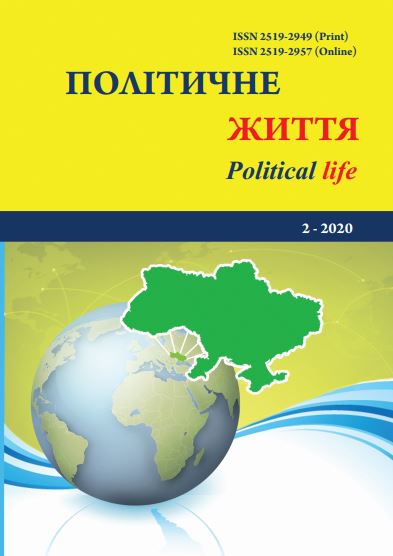Institution of political opposition.
DOI:
https://doi.org/10.31558/2519-2949.2020.2.6Keywords:
political opposition, state power, political regime, control function, democracy, transitAbstract
The article analyzes the current trends in the development of the institution of political opposition. The evolution of conceptual ideas about the essence of the phenomenon of political opposition is revealed. In a consolidated democracy, the political opposition ensures the change of political forces and elite groups in the management of the state, personnel rotation in government structures, as well as the exercise of control over political power. Instead, in transitive political regimes, the role of the political opposition is growing significantly. The quality of the institution of political opposition precedes the potential for democratization of a particular regime. The right to political opposition is one of the fundamental elements of modern liberal democracy. The ability to openly criticize the ruling elite, to defend their alternative interests, to propose other political solutions, to win power by participating in political elections is guaranteed by law. In politics, opposition is defined as: opposition to the opinion of the majority or the dominant opinion in the legislative, party and other structures that declare their commitment to democratic procedures; contrasting one's political course with another.
The importance of the institution of political opposition is due to the fact that the opposition is the potential government of tomorrow. The initial point is what place the opposition forces occupied in the system of power relations of the country, which way it came to power. Because over time, this affects the very nature of power, and how easily and painlessly the change of power will take place.
It is concluded that under the regime of polyarchy and in transitive regimes, effective, strong opposition is the key to stability in the work of the entire state mechanism. The existence of the opposition creates a balance in the political system and protects the regime not only from authoritarian manifestations, but also from the influence of subjective factors in political decision-making by the government, parliament, and other government institutions.
References
Конституція України. К. : Юрісконсульт, 1996. 73 с.
Аристотель. Политика. Сочинения. М., 1983. Т. 4. 575 с.
Гизо Ф. О средствах правления и оппозиции в современной Франции. Классический французский либерализм : сборник / [пер. с фр.]. М.: Российская политическая энциклопедия (РОССПЭН), 2000. С. 263–506.
Шумпетер Й. Капіталізм, соціалізм і демократія. К. : Основи, 1995. 528 с.
Михельс Р. Социология политической партии в условиях демократии (фрагмент).
Антология мировой политической мысли : в 5 т. Т. 2. М. : Мысль, 1997. С. 186–197.
Христюк Т.А. «Політична опозиція». Зміст, характеристика та історична еволюція. Політологічний вісник. 2003. № 13. – С.195–202.
Савицький К. І. Генезис політичної опозиції: з українського та зарубіжного досвіду. Політична опозиція: теорія та історія, світовий досвід та українська практика. К. : ТЕТ, 1996. 347 с.

